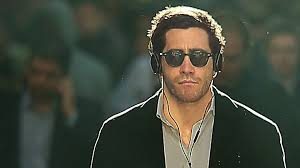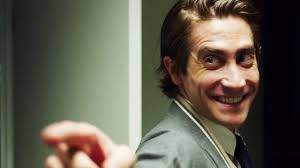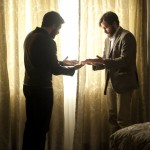JUST LIE BACK AND ENJOY IT: Movie Reviews of Elle, Nocturnal Animals and The Salesman by Howard Casner
Posted: November 25, 2016 | Author: Donald | Filed under: Uncategorized | Tags: Aaron Taylor-Johnson, Amy Adams, Armie Hammer, Asghar Farhadi, Austin Wright, Christian Berkel, David Birke, Death of a Salesman, Elle, Isabel Huppert, Jake Gyllenhaal, Laura Linney, Michael Shannon, Michael Sheen, Nocturnal Animals, Paul Verhoeven, Phillipe Djian, Shahab Hosseini, Taraneh Alidoost, The Salesman, Tom Ford | 4,119 Comments »For questions: hcasner@aol.com
First, a word from our sponsors: I wanted to say thank you to everyone who contributed to our Indiegogo campaign for 15 Conversations in 10 Minutes. We did very well due to you folks. For those who weren’t able to give, keep us in your thoughts. And if you are able to contribute in the future, contact me and I’ll tell you how. I will even honor the perks on the original campaign.
I am now offering a new consultation service: so much emphasis has been given lately to the importance of the opening of your screenplay, I now offer coverage for the first twenty pages at the cost of $20.00. For those who don’t want to have full coverage on their screenplay at this time, but want to know how well their script is working with the opening pages, this is perfect for you. I’ll help you not lose the reader on page one.
Ever wonder what a reader for a contest or agency thinks when he reads your screenplay? FosCheck out my new e-book published on Amazon: Rantings and Ravings of a Screenplay Reader, including my series of essays, What I Learned Reading for Contests This Year, and my film reviews of 2013. Only $2.99. http://ow.ly/xN31r
and check out my Script Consultation Services: http://ow.ly/HPxKE
Warning: SPOILERS
 SPECIAL NOTE: the review of Elle is especially riddled with spoilers, but I don’t know really how else to talk about it.
SPECIAL NOTE: the review of Elle is especially riddled with spoilers, but I don’t know really how else to talk about it.
There has been a lot written of late when it comes to the use of rape as a plot point in movies about women. More and more, for many viewers and critics, the use of such a storyline has turned into a cheap device and exploitive way to get an audience, especially men, to tune in.
It may have even become so polarizing that, to some extent, it has made it difficult to write about a film in which sexual assault is central to the action.
For example, I have seen three movies lately that have employed attacks on women as part of the narrative. Two were explicitly rapes, the other a bit more ambiguous. But in the two that were explicit, I couldn’t tell if the rape felt exploitive because that’s what it was, or that it felt exploitive because the political climate today is such that it doesn’t allow it to be anything but. Read the rest of this entry »
IT’S A JUNGLE OUT THERE: Demolition and The Jungle Book
Posted: April 25, 2016 | Author: Donald | Filed under: Uncategorized | Tags: Ben Kingsley, Bill Murray, Bryan Sipe, C.R.A.Z.Y., Chris Cooper, Christopher Walken, Dallas Buyers Club, Demolition, Disney, Favreau, Idris Elba, Jake Gyllenhaal, Jean-Marc Vallee, Justin Marks, Lupita Nyong’o, Naomi Watts, Neel Sethi, Rudyard Kipling, Scarlett Johansson, The Jungle Book, Wild | 1,608 Comments »First, a word from our sponsors: I am now offering a new service: so much emphasis has been given lately to the importance of the opening of your screenplay, I now offer coverage for the first twenty pages at the cost of $20.00. For those who don’t want to have full coverage on their screenplay at this time, but want to know how well their script is working with the opening pages, this is perfect for you. I’ll help you not lose the reader on page one.
Ever wonder what a reader for a contest or agency thinks when he reads your screenplay? Check out my new e-book published on Amazon: Rantings and Ravings of a Screenplay Reader, including my series of essays, What I Learned Reading for Contests This Year, and my film reviews of 2013. Only $2.99. http://ow.ly/xN31r
and check out my Script Consultation Services: http://ow.ly/HPxKE
Warning: SPOILERS
 For the first third of the new drama Demolition, Jake Gyllenhaal plays Davis, a man whose wife recently died in a traumatic car crash, one which he witnessed (he was in the passenger seat beside her).
For the first third of the new drama Demolition, Jake Gyllenhaal plays Davis, a man whose wife recently died in a traumatic car crash, one which he witnessed (he was in the passenger seat beside her).
After the accident, he starts acting, well, somewhat odd. He doesn’t seem to show any emotion or even grieve in any way. He returns to work earlier than expected. He distances himself from a scholarship his father-in-law wants to create in his daughter’s name.
But most important, at least in terms of the story, after a candy machine refuses to give him his order, he starts writing to the customer service department of the manufacturer. However, he doesn’t just air his grievance, he also spills his real feelings about his wife and what is happening to him. Read the rest of this entry »
STAR TURNS: Movie reviews of Southpaw and Mr. Holmes by Howard Casner
Posted: August 6, 2015 | Author: Donald | Filed under: Uncategorized | Tags: 50 Cent, Antoine Fuqua, Bill Condon, Forest Whitaker, Gods and Monsters, Ian McKellen, Jake Gyllenhaal, Jeffrey Hatcher, John Sessions, Kurt Sutter, Laura Linney, Milo Parker, Mr. Holmes, Oona Lawrence, Rachel McAdams, Southpaw | 1,142 Comments »First, a word from our sponsors: I am now offering a new service: so much emphasis has been given lately to the importance of the opening of your screenplay, I now offer coverage for the first twenty pages at the cost of $20.00. For those who don’t want to have full coverage on their screenplay at this time, but want to know how well their script is working with the opening pages, this is perfect for you. I’ll help you not lose the reader on page one.
Ever wonder what a reader for a contest or agency thinks when he reads your screenplay? Check out my new e-book published on Amazon: Rantings and Ravings of a Screenplay Reader, including my series of essays, What I Learned Reading for Contests This Year, and my film reviews of 2013. Only $2.99. http://ow.ly/xN31r
and check out my Script Consultation Services: http://ow.ly/HPxKE
Warning: SPOILERS
 I’m not about to say that director Antoine Fuqua is a great filmmaker by any means. But he is a solid craftsman of pieces of entertainment, perhaps one of the best around today. His films are technically impressive, satisfactorily written and they deliver the goods.
I’m not about to say that director Antoine Fuqua is a great filmmaker by any means. But he is a solid craftsman of pieces of entertainment, perhaps one of the best around today. His films are technically impressive, satisfactorily written and they deliver the goods.
And Southpaw is no exception. It’s a movie that doesn’t take you anyplace new (in fact, it takes you to a myriad of places you’ve been before). And when it comes to, say, boxing movies, I don’t think it’s an insult to say he’s no Martin Scorsese (Raging Bull) or John Huston (Fat City).
At the same time, I don’t think you’ll be disappointed if all you want to do is spend a couple of hours being amused, diverted and distracted. And actually, if truth be told, Southpaw is probably a bit better than that.
I do think the main reason for this, as if I have to tell you, is the performance of Jake Gyllenhaal as the lead character Billy Hope (Hope?, really? Okay, sure why not). Striving very hard to be taken seriously as an actor since his Oscar nominated performance in Brokeback Mountain, he has pushed the boundaries of the types of character he plays in movies from Jarhead to Zodiac to his magnificent tour de force last year in the creepy, creepy Nightcrawler. Read the rest of this entry »
HEARTS OF DARKNESS: Movie reviews of Nightcrawler, Force Majeure, and Listen Up Philip by Howard Casner
Posted: November 10, 2014 | Author: Donald | Filed under: Uncategorized | Tags: Bill Paxton, Brady Corbet, by Ruben Ӧstlund, Dan Gilroy, Force Majeure, Jake Gyllenhaal, Johannes Kuhnke, Kevin Rahm, Lisa Loven Kongsli, Nightcrawler, Renee Russo, Riz Ahmed, Robert Elswit | 4 Comments »First, a word from our sponsors. Ever wonder what a reader for a contest or agency thinks when he reads your screenplay? Check out my new e-book published on Amazon: Rantings and Ravings of a Screenplay Reader, including my series of essays, What I Learned Reading for Contests This Year, and my film reviews of 2013. Only $2.99. http://ow.ly/xN31r
Warning: SPOILERS
 After my friend and I left our screening of Nightcrawler, the new L.A. based neo-noir starring a somewhat gaunt and coyote looking Jake Gyllenhaal, we both commented on how much fun the whole thing was.
After my friend and I left our screening of Nightcrawler, the new L.A. based neo-noir starring a somewhat gaunt and coyote looking Jake Gyllenhaal, we both commented on how much fun the whole thing was.
And then we wondered, is that really an appropriate reaction to what we just witnessed?
Because Nightcrawler is, well, kind of sick. It’s also dark and edgy and depressing and all the other points of the Scouts’ law and certainly one of the more unflattering looks at humanity that you’ve had the privilege of seeing in some time (everyone has Lady Macbeth hands in this film).
But it’s also kind of exciting and gripping and keeps you grabbing at your armrests.
And yes, indeed, make no mistake about it, it’s also a ton of fun. Read the rest of this entry »
DOUBLE CROSS: Movie Review of Enemy by Howard Casner
Posted: March 23, 2014 | Author: Donald | Filed under: Uncategorized | Tags: Denis Villeneuve, Enemy, Isabella Rossellini, Jake Gyllenhaal, Javier Guillon, Melanie Laurent, Sarah Gadon | 1 Comment » Before I begin, a quiz:
Before I begin, a quiz:
Let’s say that you were watching a movie and you saw someone in said movie that was the spitting image of yourself, and I mean, as far as you can tell, he could be your identical, not fraternal, twin. You know, like in that movie starring Haley Mills (okay, okay, if you really feel the need to brag and say you are too young to have seen that, then the one starring Lindsay Lohen). Would you: Read the rest of this entry »
Movie Review of PRISONERS by Howard Casner
Posted: September 15, 2013 | Author: Donald | Filed under: Uncategorized | Tags: Aaron Guzikowski, Denis Villenvue, Hugh jackman, Jake Gyllenhaal, Len Cariou, Mario Bello, Melissa Leo, Paul Dano, Prisoners, Terrence Howard, Viola Davis, Wayne Duvall | 5 Comments »For the 2011 Oscars, Canadian director Denis Villenvue’s film Incendies (a puzzle film about twin brother and sister who find out they are closer to their unknown father and brother than they thought) was nominated for best foreign language film. In punishment for his sins, Villenvue was given the movie Prisoners to make.
Actually, I don’t know if this is accurate or not. As far as I really know, this was Villenvue’s pet project from beginning to end. But it sure feels like proof of that anecdote by Michael Haneke who came to the U.S. and was presented with a screenplay so outside his purview, he asked (and I paraphrase), “Is this what Hollywood is? You come here and they just give you whatever screenplay they have lying around in a drawer” (a viewpoint that seemed proven as far as I was concerned when the dynamic Korean filmmaker Chan-wook Park was given the embarrassing screenplay of Stoker to make).
There is one good scene in Prisoners, a routine thriller about child abduction written by relatively newcomer Aaron Guzikowski. It comes early on with Jake Gyllenhaal as Detective Loki (Loki? Okay, sure, why not) interacting with a waitress at a Chinese restaurant. They talk about animal signs and fortune cookies and it has nothing to do with anything, but it is witty and fun. But after that (and before that as well), everything goes downhill rather quickly. It plays with religious imagery, but that all feels clichéd and under dramatized. And the movie brings nothing new to the genre, seeming to have no real purpose for existence, even the purpose of a movie that does nothing, but does it very, very well.
Prisoners is a one note film. It starts at a relatively high point of tension (even before anything happens) and pretty much stays there the whole time. Everyone seems so angry in the film. Hugh Jackman, trying a bit too hard to play against type as everyman working class father Dover, feels angry from the opening shot (both literally and figuratively, but you’ll have to see the movie to get the pun). And the scenes with Loki at the police station are so filled with furious confrontation, it feels like an episode of Law & Order: SVU (I never knew how anyone could stand working with anyone in that show, they were all so unprofessionally mean to each other). Even the weather is angry; it’s always overcast, raining or snowing. And when there’s no place for anyone to go, when they do go there, it tends to become camp, over the top and unintentionally funny.
There’s only one really effective performance in the move and that is Wayne Duvall as the Captain at Loki’s precinct. He’s one of those, I know I’ve seen him a million times before, though I can’t quite place where, actor. And he is spot on. But everyone else, Jackman, Terrence Howard, Viola Davis, the unrecognizable Melissa Leo and Len Cariou (or maybe I just didn’t want to recognize them), and the unfortunately recognizable Paul Dano, just can’t do much with what they’re given. At least Mario Bello, as Dover’s wife, is lucky enough to have a character so traumatized she takes sleeping pills and is out for most of the film.
Because I and my friends could never become emotionally involved in the movie (though our eyebrows got plenty of exercise as we rolled them over and over again), all that was left for us was to wait, and wait…and wait, until we find out who did it. And because we could never become emotionally involved, all we did afterwards was pick apart the plot (a highly convoluted one by the time it’s over, a bit too clever perhaps than was necessary, but it did seem to hold together). If we had been riveted by what was going on and so involved with the characters and what they were going through, we probably wouldn’t have cared about the details so much (especially a particularly hysterical one at the end where Loki has the choice of calling 911 for help or speeding to get a little girl to a hospital down a crowded freeway during a deluge of a rainstorm while in danger of blacking out from being shot—guess which one he chooses?).
I do hope that as far as Villenvue is concerned, this was a take the money and run movie and that he’ll next return to his roots and make something that means something to him and not to some producer’s profit sheet. We can only hope.
Movie Review of END OF WATCH by Howard Casner
Posted: October 6, 2012 | Author: Donald | Filed under: Uncategorized | Tags: America Ferrera, Anna Kendrick, David Ayer, David Harbour, End of Watch, Jake Gyllenhaal, Michael Pena | 7 Comments »End of Watch (written and directed by Training Day’s David Ayer) is basically the 21st century version of Adam 12, but instead of the bland, slightly robotic offspring of Jack Webb’s Joe Friday from Dragnet, we have two bullying, near psychopathic officers with messianic complexes (or asshole pricks as we say in the vernacular). I’m not sure it’s an improvement, but I am glad that LAPD police cars still have the words “to preserve and protect” in quotation marks as they did in Friday’s day (this last is an in-joke for anyone who’s seen Thom Anderson’s Los Angeles Plays Itself).
The movie is basically a series of episodes over a year or so in the life of Officers Brian Taylor (Jake Gyllenhaal) and Mike Zavala (Michael Peña), two partners who banter like the best of them. And that is the strongest aspect of the movie. Gyllenhaal and Peña act their characters for all they’re worth, playing off each other’s lines with a well, practiced feeling of improvisation. Ayer has a definite ear for how his characters talk and relate to each other.
But still…these are one scary set of dudes, bro. I mean, these dudes are scary. I certainly wouldn’t want to meet them in a well lit alley, much less a dark one. And that’s not the worst of it. There’s only one thing worse than asshole pricks. That’s asshole pricks that are always right.
And man, are these guys amazing or what? Well, the movie opens with a wild chase scene where the two officers force the other vehicle to crash and then take the two bad guys out with the greatest of ease. They answer a call on abducted kids and they find them tied up with duct tape in a back closet (no fool these guys, they can see through a drug addict’s paranoia like no one else). They decide to stop a truck on a routine traffic violation and are almost shot, discovering drug money in the process. They make the enemy of a cartel by answering a noise complaint and discovering a house trafficking in illegals. But most amazing of all, they save three children from a burning house with a single bound (well, a double bound, they actually go back for the third kid). Man, after awhile, it was like watching Meryl Streep’s life story in the Defending Your Life.
I mean, are these guys insufferable, or what? At the same time, Ayer does do something very well here. As much as you want these guys to get their comeuppance, when you realize how it’s going to come, you find that’s it’s really the last thing you want. And the ending is powerful (in spite of the fact that it, like many of the action scenes, are based on the cliché that people only get shot when it’s convenient for the plot). It socks you in the gut and you repent of all the awful things you’ve been wishing on these guys up until then.
The story is based on the conceit that Brian is filming everything. Well, sort of. Sometimes it seems obvious that what is happening is not being, or couldn’t be, caught on a camera. In addition, Brian is doing it for a school project, in spite of the fact that he never goes to school; never does homework; and never finishes the project. So in the end, the conceit is so inconsistent and arbitrary, one wonders why Ayer used it in the first place. At the same time, there are some scenes that, because they are filmed this way, give the whole enterprise a stronger feeling of realism.
The supporting cast has some unusual suspects in it. Anna Kendrick plays Brian’s girlfriend and then wife, Janet, and America Ferrera plays Orozco, a fellow officer. Both are both very good, but it may be unclear exactly what they are doing here in supporting roles. Kendrick is an Oscar nominee for Up in the Air, and Ferrera has won numerous awards (including an Emmy and Golden Globe) for her TV series Ugly Betty. Is this really the best that filmdom can do for these two talented actresses? Just throw them away in some minor role in an independent film? Is this really the state of American movie making today?
In the end, how one feels about End of Watch will probably depend on how much one can stomach the central characters. I guess I’m a pussy. For me, they were so obnoxious and annoying I found myself identifying with David Harbour, one of their fellow officers and bullying victims, who keeps warning them that they are playing with fire and are going to get burned. He’s out of the picture half way through, but I sympathize: I couldn’t figure out who was worse to deal with, the bad bad guys or the good bad guys.











